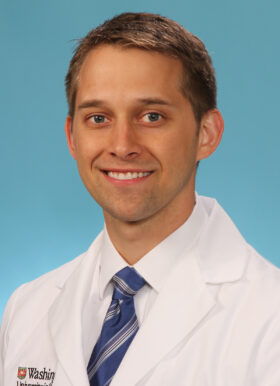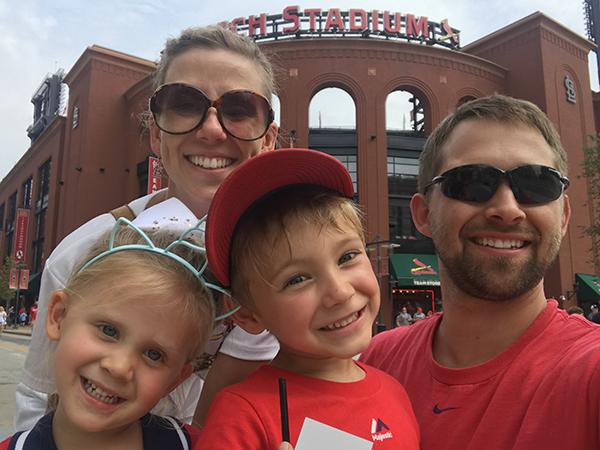Ryan S. Jackson, MD

Ryan Jackson, MD, is an assistant professor in Ear, Nose and Throat (Otolaryngology).
His areas of specialty include head and neck cancer, transoral robotic surgery, surgical treatment of sleep apnea, minimally invasive surgery for oropharyngeal cancer, HPV-positive oropharyngeal cancer, microvascular free tissue transfer reconstruction of major ablative head and neck defects, thyroid neoplasms, benign and malignant salivary gland neoplasms, benign and malignant head and neck tumors, osteoradionecrosis of the mandible.
Dr. Jackson sees patients at:
Center for Advanced Medicine
4921 Parkview Place, Suite 11A
St. Louis, MO, 63110
Barnes-Jewish West County Hospital – Medical Building 4
1044 North Mason Road, Suite L20
Creve Coeur, MO
Christian Hospital – Medical Building 2
11125 Dunn Road
St. Louis, MO 63136
Please call 314-362-7509 for an appointment
What happened in the course of schooling to influence you to choose your specialty?
I received my undergraduate degree at St. Louis University in nuclear medicine (imaging technology used in PET scans). While working in that division of radiology, I was exposed to different specialties that were all very interesting. Working at St. Louis University Hospital, we worked closely with cardiologists when performing stress tests with nuclear tracers. That exposure got me excited about pursuing medical school.
During medical school, my plan was to become a cardiologist. It was during my surgical rotation in my third year of medical school that I realized how much I enjoyed surgery. I have always had a knack working with my hands, building things, and fixing my own cars and trucks – so the operating room was a natural fit.
What led me down the path to the specialty of Ear, Nose and Throat (ENT) happened during my surgical elective rotation in otolaryngology. It was there that I met my mentor, Dr. Mark Varares, who was ENT department chair at SLU at the time, and he is one of the main reasons I chose ENT as my specialty.
There are many sub specialties in ENT – otology (ears), rhinology (sinuses), facial plastic surgery. I was drawn to head and neck cancer surgery in ENT because I found the surgeries complex and exciting.

What brought you to Washington University?
I’m from the St. Louis area — born in Granite City, and our family moved to Troy, Illinois when I was in grade school. I went to St. Louis University for undergrad and medical school. My wife is also a St. Louis graduate. We lived in Florida for residency, and some of her family had recently moved to Florida. So when my wife and I were looking for a place to live and work, we were concentrating on Florida and St. Louis. Because Washington University is a top notch program, with a world-class reputation and great resources to start a practice, it was hard to pass up the opportunity to work here.
Which aspect of your practice is most interesting?
Transoral robotic surgery is a surgical technique using the da Vinci robotic instrument, and is the part of my practice I am most passionate about. This is the same robot that urology and gynecology uses for their robotic surgeries. About 10-15 years ago it was adapted to be used in the mouth.
With this robotic technique we are able to go through the natural orifice of the mouth to reach the deeper structures. The robotic camera and arms allow us to reach the back of the tongue, the top of the voice box and the throat. Before we had this robotic surgical method, the only option to access the head and neck was what is called an open procedure. We would cut through the lip and the jaw bone to access that area. Or we’d have to make a cut through the neck into the throat to access tumors and cancers of that area.
The recovery from the open procedure can have complications, and the patient may require long-term tracheotomy tubes and reconstructions of the area where the hole was created.
Because of robotic instrumentation and the minimally invasive approach, the access is easier, the swallowing function is drastically improved and patients typically do not need a tracheostomy tube. The hospital stay is usually a couple of days, compared to a week or more after the open procedure.
I can’t even remember the last time I did an open surgery for oral pharynx cancer of the tongue base.
I also teach transoral robotic surgery on a departmental and national level through the American Head and Neck Society, and it is very rewarding. I have trained dozens of surgeons on the new da Vinci SP robot. To see colleagues and surgeons who I’ve trained across the country, practice safe and effective transoral robotic surgery is one of the most exciting parts of my young career so far.
Are there any other new developments in your field are you most excited about?
The original da Vinci robot was ground breaking 10-15 years ago for head and neck cancer, and now there is the da Vinci SP – which stands for single port. All the instruments come out of one port instead of three separate arms working independently. The single port benefits both the surgeon and the patient – allowing improved access to areas that are difficult to reach.
Another exciting development is a new device for surgical treatment of sleep apnea. The mainstay of treatment for sleep apnea is a CPAP machine where the individual receives positive pressure through a mask to help relieve any obstruction that he or she may have while breathing and sleeping. Unfortunately, many patients don’t tolerate wearing that mask every night.
For patients who can’t tolerate the CPAP machine, we now have a new surgical treatment option.
This new option is device, like a pacemaker, that is surgically implanted into the chest and connected to a nerve that moves the tongue. It is paced, based on the patient’s breathing. At night the patient turns on this machine with a small remote before going to sleep. There is a 30-minute delay designed to kick in after the patient is asleep. Every time the patient breathes in, the implant sends a signal to stimulate the back of the tongue, moving it forward to increase the space in the back of the throat.
The outpatient procedure is groundbreaking because within about one to two months of receiving the implant, 90-95% of people are cured of their sleep apnea.

Was your fellowship in transoral robotic surgery?
Yes, when I did my fellowship, I was looking for an institution that offered training doing high-volume, high-quality transoral robotic surgery, in addition to micro vascular reconstruction, or free flaps. There were only a handful of institutions across the country that checked both those boxes, and the Mayo Clinic in Rochester, Minnesota was one of them.
Microvascular reconstruction involves taking a part of a patient’s body with the vasculature to that part and transplanting it to the face or head and neck in order to reconstruct defects that are either made by tumors, trauma or infection that can cause loss of tissue.
If a patient has a cancer of his or her jaw, we can remove the jaw and restore function by replacing it with bone from the leg or shoulder blade through microvascular techniques like transplants.
Where are you from?
The St. Louis area is home to me. I was born in Granite City and moved to Troy, Illinois where I graduated from Triad High School. I spent much of my time in high school wrestling. My dad was a bricklayer at Granite City Steel, and then started a masonry company – where I spent many summers working labor. We spent a lot of time in southern Illinois camping, hunting and fishing
WashU is such a top-notch program with great reputation, experience, and resources – it was an opportunity I could not pass up. Being a surgeon, it can be hard to get away, so having extended family nearby is critical.
Most of our family still lives in Illinois, and we are blessed to spend so much time together, and for our kids to grow up with their cousins. We also have a little farm not too far from here, so our kids get to see their cousins all the time. Spending a day playing in the Meramec river makes for great family time and memories.
And now for the St. Louis question … where did you go to high school?
That’s interesting because I never knew it was a thing until I went to St. Louis University and people started asking me where I went to high school. My response was, what do you mean? I lived in Troy, Illinois, so I went to Triad because that was the high school. I didn’t know you had choices!
Are you involved in any research at the present time?
Most of what I do is clinical research. I’ve done a lot of research on transoral robotic surgery, head and neck surgery, as well as free flap reconstructions. Looking at how we can improve outcomes for our patients.
Which particular or award is most gratifying?
I’d say the most gratifying award I’ve ever received was when I got the Excellence in Teaching Award from the residents here at WashU in 2018 and 2020. It left me speechless because I was recognized as their most significant faculty teacher during their residency. It is humbling and honoring for them to have selected me not once, but twice in three years.
What is the best advice you’ve received?
The best advice I’ve received was “always work hard and do a great job.” As a head and neck cancer surgeon, I do the best I can with a lot of passion.
Also, don’t make your job your entire life. It is important to have a good balance in life with family, activities and interests you enjoy outside of work. A colleague and mentor always said, “Don’t neglect your family, your department chairman does not pick your nursing home.”
If you weren’t a doctor, what would you like to be doing?
I’m a very mechanically inclined person, and like to tinker, so if I could do anything, I would likely be a mechanic of some sort.
Much of my family is in construction and likes working on cars. My uncle has a large garage with a car lift. We will often take our cars to his place, change the front end or the rear differential. Our family will spend the day hanging out together, getting a little dirty and fixing our cars.